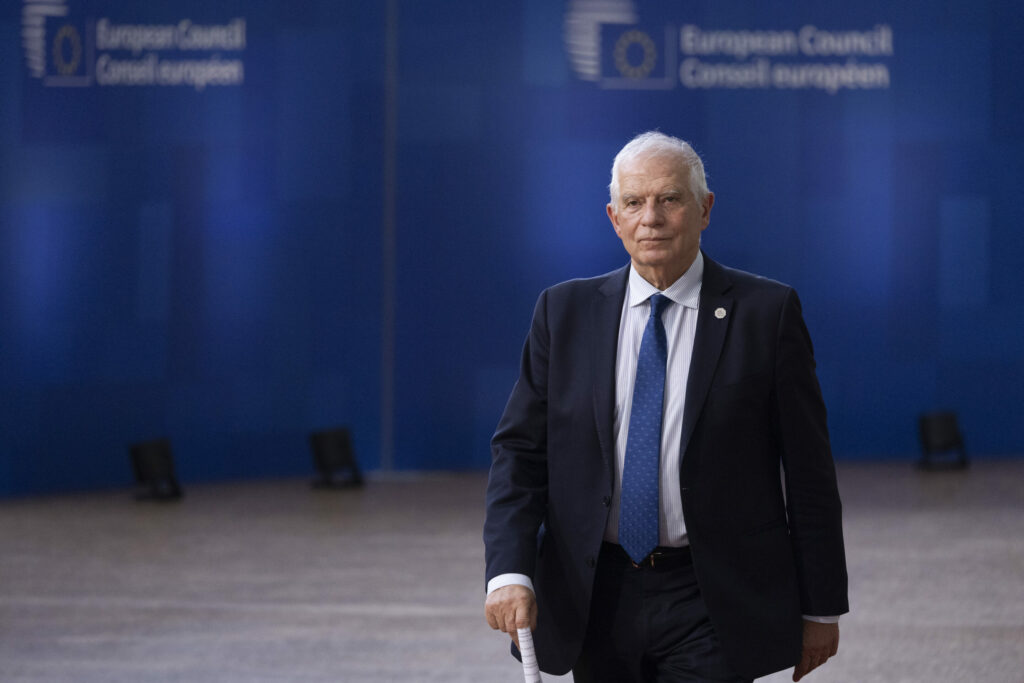An "immediate humanitarian pause" in Gaza that could lead to a "sustainable ceasefire" was agreed upon by 26 (not 27) EU Member States at the Foreign Affairs Council meeting in Brussels on Monday, announced the EU High Representative for Foreign Affairs and Security Policy, Josep Borrell.
Hungary refused to sign, just as it had done earlier with another statement made by the High Representative at the Munich Security conference on Sunday. The EU is very concerned about Israeli government plans for a possible ground operation in Rafah, where well over a million Palestinians are currently sheltering from the fighting, he said.
In the statement, the EU recognises the right of Israel to defend itself in line with international law and international humanitarian law. Borrell asked the Israeli government "not to take military action in Rafah that would worsen an already catastrophic humanitarian situation and prevent the urgently needed provision of basic services and humanitarian assistance".
Monday's declaration, adopted at the end of a day of negotiations led by the Belgian EU Presidency, is identical to his statement but without the required unanimity.
It constitutes an "extremely positive compromise", given the initial positions of the Member States on the Middle East question, emphasised Belgian Foreign Minister Hadja Lahbib, who published the statement on her website.
"Better to move forward with 26 than to be immobile with 27", she added, noting the isolation of Viktor Orban's regime within the EU. "We are sending a clear message to Israel", and "that is what is important", according to the head of Belgian diplomacy.
The declaration added the following paragraph to Borrell's original statement: "This requires an immediate humanitarian pause which will lead to a sustainable ceasefire, the unconditional release of all hostages and the provision of humanitarian aid."
The Council launched also launched operation ASPIDES to restore and safeguard freedom of navigation in the Red Sea and the Gulf. The decision had reportedly been delayed by opposition by Spain.
Operation ASPIDES will ensure an EU naval presence in the area where numerous Houthi attacks have targeted international commercial vessels since October 2023. It has a defensive mandate and will provide situational awareness, accompany vessels, and protect them against possible multi-domain attacks at sea.
The tasks include intercepting and destroying drones and missiles against commercial vessels, a Commission spokesperson clarified on Tuesday.
Violent settlers
Budapest is also blocking another related issue: the sanctions that the 26 other EU Member States are now preparing to take against Israeli settlers who perpetrate unprovoked violence against Palestinians on the West Bank.
The Hungarian veto prevented a unanimous text. This has not prevented Member States such as Belgium from moving forward individually, by banning them from entering their territory, emphasised Lahbib.
On Tuesday, Belgium will take the floor in The Hague at the public hearings on the request for an advisory opinion on the legal consequences of Israel's behaviour in the Occupied Palestinian Territory.
"The solution must not be a military one, but a political one. Belgium continues to support a two-state solution, and it is high time that the EU spoke with one voice," insisted the Belgian minister.
Asked at today’s press conference about the launch of EU’s independent audit of the UN agency for Palestinian refugees (UNRWA), the chief spokesperson of the Commission replied that ‘constructive’ discussions are still on-going with the agency.
The EU High Representative said last week that the audit has to be launched, but not finalized, before next payment of EU funding to UNRWA, following allegations of the complicity of its staff in Hamas. The UN has launched investigations by its office for oversight services and an external review panel. Israel claims that UNRWA has perpetuated the refugee problem since it was established in 1949.
Update: A previous version of the article has been updated.

